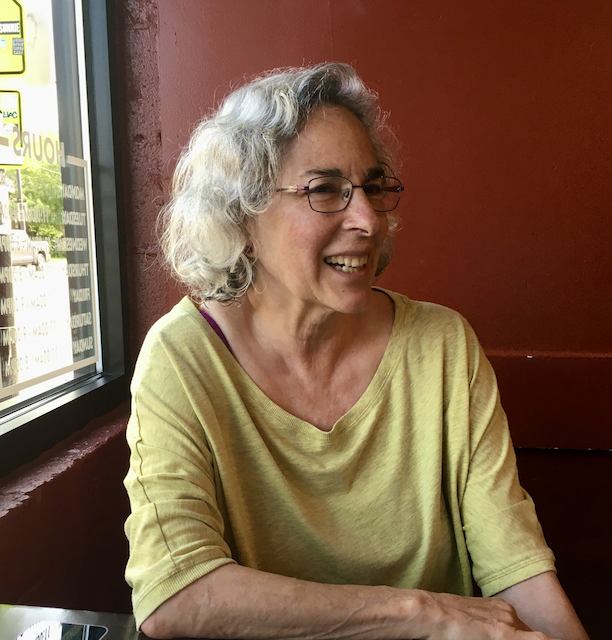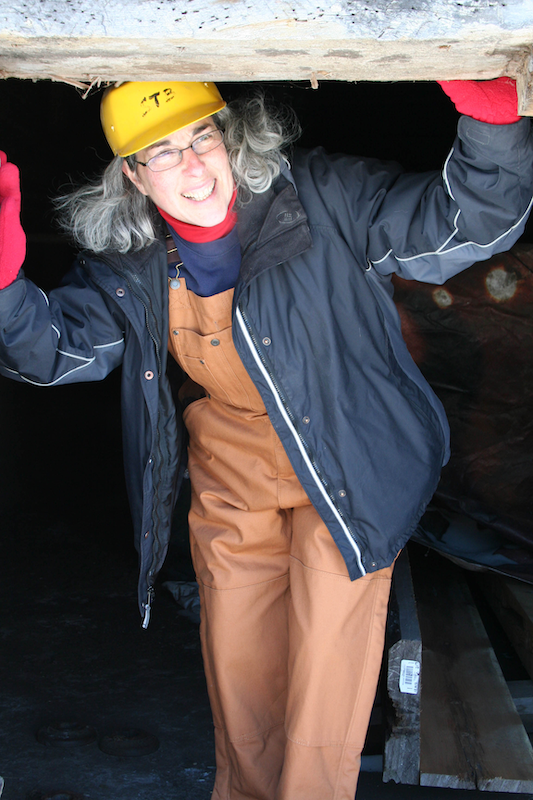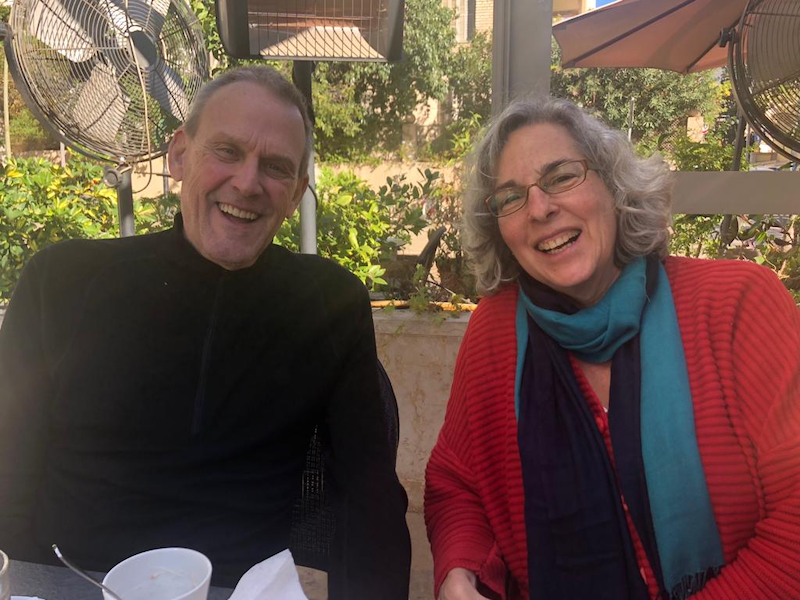
Judy Peres is writing a memoir that promises to be what booksellers call ‘a good read.’ “Old Growth: A Memoir of Love, Lumber, and Late-Life Exuberance” relates Judy’s adventures after age 60, when many of us are easing into retirement. Not Judy! She took a buyout from the Chicago Tribune and embarked on what she calls a “quixotic journey.” Along the way she learned how to start and run a business, salvage lumber, survive bankruptcy and—oh yes— “I can drive a forklift.”
It wasn’t the first time Judy had taken a quick turn in a new direction. You might say it started with her aversion to selling grits. Her first job out of college was as a junior account executive at one of Chicago’s premier public relations firms. She was invited to a brainstorming session for the Quaker Oats account. “All of these creative people are sitting around this enormous mahogany table in this red-carpeted room, and what we’re trying to figure out is how to market grits to Americans north of the Mason-Dixon Line. And I said, ‘I can’t do this’. I was raised in a basically socialist family. The idea of trying to sell things to people who don’t need them didn’t seem like a good way for me to make a living.”
Readers of the Chicago Tribune can be grateful Judy made that choice, as she went on to a 40-year career as a journalist who dug deep into serious issues, particularly at the intersection of law and medicine. But Judy didn’t take a direct route from the red-carpeted room to the Tribune Tower. She went by way of Israel, returning to the country where she had lived for three years as a pre-teen while her father completed a Fulbright scholarship and then for two more years after high school.
When asked what that experience had meant to her, Judy said, “It caused me to wonder for a very long time whether I belonged in America or in Israel. I always felt very welcomed in Israel, and I didn’t always feel welcome in America. Why? I think partly because I was Jewish, partly because I was female, partly because I was not Barbie. So I always felt a little bit of an outsider. But I think that, ultimately, it taught me that it doesn’t matter where I am. I’m really a citizen of the world.”
On her third sojourn in Israel, Judy was a graduate student at the Hebrew University in Jerusalem. She soon realized that her fellowship did not cover her living expenses. “I needed a full-time job, and the only thing I could do was write in English. I kind of talked my way into The Jerusalem Post, Israel’s English-language newspaper. I made a bit of a nuisance of myself until they agreed to hire me. Four years later, I realized that I liked my night job on the copy desk a lot better than my day job in clinical psychology. So I dropped out of grad school and I remained a journalist for the next 40 years.”
After 12 years at the Post, Judy, her Israeli husband and their two daughters returned to the US. “The right-wing Likud Party had come to power in Israel, and we were very uncomfortable with that,” she explained. “It just seemed like a good opportunity to go somewhere else and do something else. I wanted to work for a big newspaper. My husband wanted to go back to school. So I got a job at the Tribune, and he was the house spouse, taking care of the kids and going to school.”
At the Tribune, Judy rose through the ranks from copy editor to national and foreign editor, before deciding to move to the other side of the desk and be a reporter. Coincident with that decision was another detour, this time to study law. “The Knight Foundation and Yale Law School had a wonderful fellowship program for journalists. I won the fellowship in 1996, when I was 50—twice as old as my classmates.” Back at the Tribune, law degree in hand, Judy and her colleagues took on the medical profession in a series of articles questioning the value of certain cancer screenings, as well as then-new reproductive technologies. “I got a lot of radiologists mad at me,” Judy explained. “It was a field where the science had gotten ahead of the law. Getting the stories out there made people realize that something had to be done.” I don’t think my work changed the law,” she reflected, but it raised awareness. And eventually the law did catch up.”
Although she loved the work she was doing at the Tribune, she left the paper in 2008. “I took a buyout because the writing was on the wall. They could hire three people for what they were paying me. And it was also a time when there were drastic reductions in the editorial force. I was national and foreign editor. We had bureaus all over the country, and the world. I don’t think the Tribune has a single national or foreign bureau today. The copy comes from wire services. At one time there were more than 600 people on the editorial staff. Somebody who still works there told me there are now 74.”
As Judy was contemplating retirement, her partner, David Hozza, was laying the groundwork for a new venture that would consume their time, energy, finances, and eventually bring an end to their relationship. But along the way, the innocuously named Wisconsin Woodchuck LLC was “a fabulous adventure,” Judy asserts. “We were going to save six million board feet of antique, old growth wood from what had once been the world’s biggest grain elevator.” Located on the shore of Lake Superior in Wisconsin, the century-old Globe Elevator had been built mainly of Eastern white pine from the virgin forests of Wisconsin and Minnesota.

As David put it in presenting his idea to Judy, “That kind of lumber is virtually extinct. And people pay good money for reclaimed wood, especially if it has a story. What I’ve been thinking is that there might be an opportunity there.” Thus began the fabulous adventure that ended in bankruptcy some seven years later. Along the way, Wisconsin Woodchuck reclaimed about one million board feet of lumber. (In Chicago, you can see some of it in the Beatrix restaurant at Northwestern Memorial Hospital and the tap room at Half Acre Brewery.) But the 2008 recession was not in the business plan, Judy explained. “We took on a huge loan in 2008, and by that time a lot of the high-end contractors and architects who were using our beautiful, reclaimed wood were out of business.”

Judy and Dave made valiant efforts to save the business, including appearing on “Ax Men,” a reality TV show, an experience Judy describes as surrealistic. They also found a small market for another raw material contained in the grain elevator—real wrought iron, a commodity much in demand by blacksmiths. Like old-growth pine, wrought iron was once a common construction material until it was supplanted by steel. A visiting artist-blacksmith from San Francisco confirmed that the wrought iron rods reinforcing the grain bins were the real thing, and Woodchuck was able to sell some of the 7,500 rods to blacksmiths and designers of ornamental ironwork. But the venture that had been founded in hopes of salvaging century-old sustainable building materials could not itself be salvaged. Judy matter-of-factly relates its demise: “The bank foreclosed on us. And then the principals all had to file for personal bankruptcy because the lender came after us. But that wasn’t too bad. I had a ten-year-old car, a condo that was underwater, a pension and an IRA. And all of those things were exempted from the bankruptcy. So all I had to lose was some credit card debt and what was left of my self-respect.”

David Holmquist and Judy in Israel
Returning to Chicago after the Woodchuck adventure, Judy soon met another David—surname Holmquist—and they became partners. “He’s an activist, and when I met him he was doing climate work. I joined him in that. More recently, we’ve gotten involved in working with migrants, with a Hyde Park group called Neighbors United for Mutual Support (NUMS), which is basically a free legal clinic. We help people file their asylum claims and applications for work permits, try to keep them legal and protect them from detention and deportation.”
Judy also makes time in her life for singing with the Hyde Park Sounds Good choir. She likes the challenge and discipline required to learn the music, as well as the community she finds in the choir. “The thing I like best about Sounds Good is that it’s the only place I’ve ever been where, as an old person, I feel completely welcome and comfortable. [In other places] there’s always a little bit of outsiderness… similar to what I felt as a teenager. But I never have that feeling in Sounds Good. I don’t have to try to be Barbie anymore!”
Judy’s in the final round of revisions on her memoir, and her agent is actively seeking a publisher. Asked what she hopes readers will take from her story, Judy replied, “I want it to be fun. I see it as a kind of rom-com. It was a love story, and it was a grand adventure. I think older people might find it interesting to know that somebody in their 60s and 70s would take on something so ambitious, so quixotic, have fun with it and feel good about having come out the other side.”
Editor’s note: Sounds Good will let our readers know when Judy’s book is published. In the meantime, you can see a bit of the story on her website, www.judyperes.com.

Thanks for an inspiring profile of a wonderful woman!!